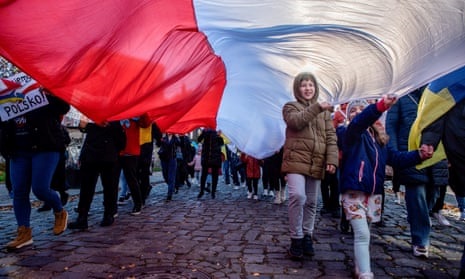
Ukrainian refugees with a Polish flag in Gdańsk, Poland.
Photo Sopa Images
‘Western democracies want Ukraine to win – but are they all happy for Europe’s centre of gravity to migrate eastward?’ - Anna Gromada, a social scientist and co-founder of the Warsaw-based Kalecki Foundation thinktank, puts such a question in “The Guardian”.
If the outcome of the war could be determined by the toss of a coin, the camps would be clear: democracies would want Ukraine to win, autocracies would want it to lose. But real-world political outcomes are not so binary, - writes Anna Gromada. They typically fall on a spectrum between ‘annihilation’ and ‘total victory’. This leaves the democracies divided into at least three camps: the English-speaking, the western European and the eastern European minus Hungary.
For Poland and the Baltic countries the matter is simple. They want Ukraine’s victory to be unequivocal. The advantages would be both material and psychological.
Ukraine’s success would also entail a historic chance for the region to exit the status of the periphery and become a counterbalance to the EU’s big western member states. With a historic project of the Intermarium they could become ‘a buffer of allied countries’ stretching from the Baltic to the Black Sea to counterbalance Russia’s power.
For Poland, such a scenario would be a double jackpot!
For the first time since at least the 17th century, we would get over the problem of “the neighbourhood” – a comfort that most western Europeans have taken for granted since the end of the Second World War. A united region across eastern Europe, with the human and economic capacity of more than 100 million citizens, could offset the dominance of the old Rhineland in the EU.
Poland and Ukraine are much poorer today than France and Germany. How could they realistically become a countervailing force in the future EU?
Western Europeans might not be ready for the geopolitical centre of gravity to shift eastward – let alone at the price of increased US influence across the continent.
After the Cold War, western Europe became a reluctant ally of the US and the main beneficiary of a post-Berlin Wall triangulation: Russian energy, Chinese markets and American security. Now the first pillar is gone and the second may be the price to pay for the third.
France and Germany currently endorse a policy of “strategic autonomy” for Europe, a defence and security idea that could one day lead to an EU army.
What both strategies have in common is an aversion to “Anglo-Saxon” dominance in Europe.
American and eastern European interests today seem aligned.
There seems to be a residual hope in the US that, as long as Russia stands on its feet, it can eventually be pivoted towards the west and used against China – in a reverse Kissinger manoeuvre. In eastern Europe, this idea is greeted with horror.
All major Polish parties support Ukraine but they also hope that, while the arc of the history is long, it will eventually bend towards a new geopolitical order.
They want to see Europe’s centuries-old western orientation overturned and Poland the undeclared winner, - writes Anna Gromada in the London newspaper.
… These are very important confessions from the Polish analyst. Old Europe should see how Poland with the Anglo-Saxons is working for its collapse in favor of the United States and the Eastern limitrophes.
read more in our Telegram-channel https://t.me/The_International_Affairs

 13:17 19.11.2022 •
13:17 19.11.2022 •






















